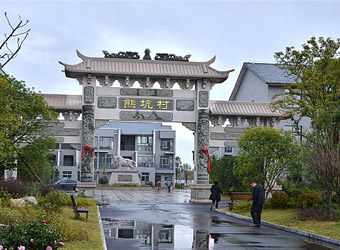China’s escalating property prices have long been a concern for the country as it balances growth targets with social stability. Now, economic signals are giving the go-ahead to authorities for sustained efforts to cool off the real estate market.
On Monday, China’s National Bureau of Statistics reported average new home prices in the country’s 70 major cities rose 0.2 percent in September, Reuters calculations show. That comes after the last two years saw substantial increases.
Compared with the year-ago period, new home prices rose 6.3 percent in September, cooling from an 8.3 percent increase in August, Reuters calculations show.
This tapering off in price increases came after a series of government measures in the last year to cool the red-hot property market amid fears of an asset bubble.
Last Wednesday, President Xi Jinping signaled that the state is likely to continue managing the property market. At the opening of a once-every-five-years leadership confab, Xi said “housing is for living in, not for speculation.”
For their part, Chinese authorities will now have room to let the property market relax after good growth data in the last week, said Phillip Zhong, senior analyst at research firm, Morningstar.
On Thursday, China reported third-quarter growth data at 6.8 percent that met expectations.
The “strong GDP number will give policymakers the room as well as confidence to continue the tightening policy without the fear of a slowing property sector dragging down the entire economy,” Zhong told CNBC.
Real estate contributed 6.5 percent to overall GDP in China in 2016, state-owned China Daily reported in January, citing the country’s National Bureau of Statistics.
Last week’s third-quarter data revealed China’s property sector grew 3.9 percent against the year-ago period — down from a 6.2 percent on-year increase for the second quarter. Meanwhile, year-over-year growth in construction activity slowed to 4 percent in the third quarter from 5.4 percent in the second quarter.
The services sector, however, expanded 8 percent year-over-year in the third quarter compared to a 7.6 percent year-over-year second quarter rise — picking up some of the economic slack from the real estate market.
The current synchronized global recovery is helping the largely export-driven Chinese economy and will give the country a bit of buffer in terms of reducing the reliance on debt and fixed asset investment, Helen Zhu, head of China equities at BlackRock told CNBC last week.
In September, China’s exports were up 8.1 percent from a year ago in dollar terms, while imports were up 18.7 percent.
Morningstar’s Zhong said he expects the government to continue its property tightening policy in the short-term as the market is set for long-term support due to rapid urbanization.
Last Monday, the People’s Bank of China quoted its governor, Zhou Xiaochuan, as saying the world’s second-largest economy is likely to post growth of 7 percent in the second half of the year thanks to rapid household spending. First half GDP growth was 6.9 percent.
That is more optimistic than the target China had set earlier this year when premier Li Keqiang said the country was aiming to expand its economy by around 6.5 percent in 2017.
Source: CNBC


